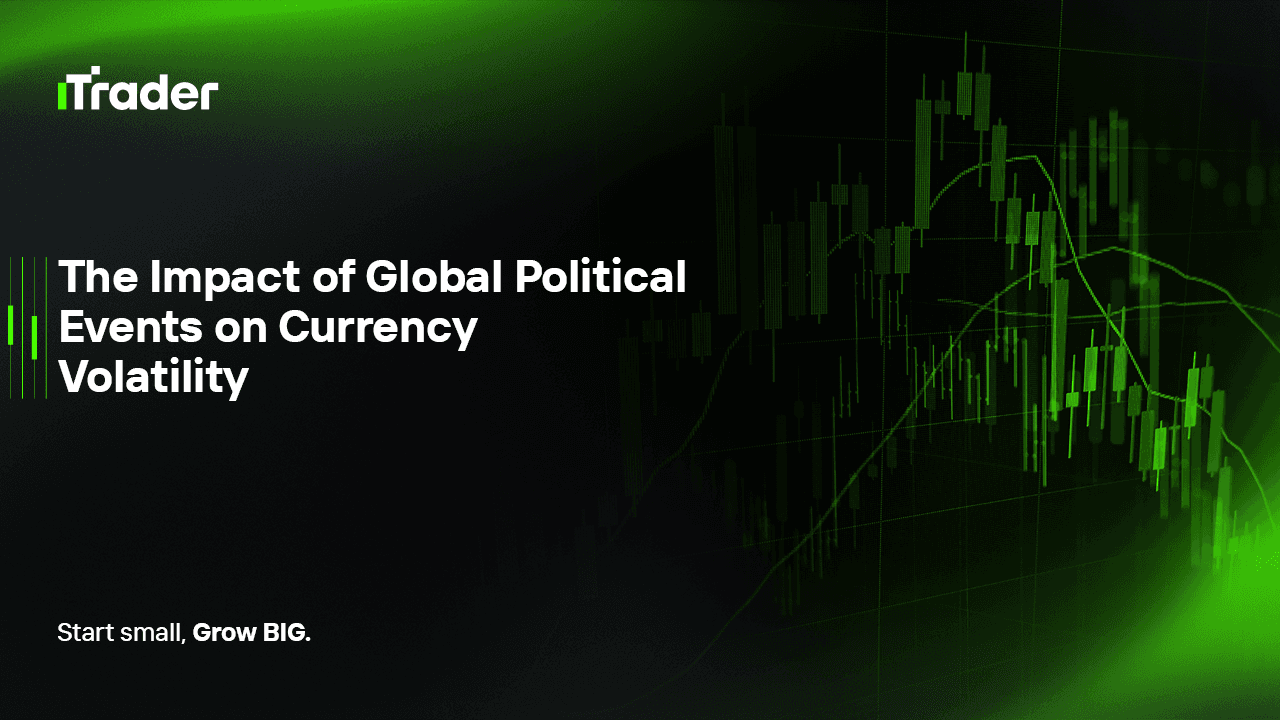2025-07-04
success depends not only on technical setups and statistical edges but also on navigating the unpredictable terrain of global political events. Geopolitical turmoil, policy changes, and election cycles often catalyze sharp movements in currency pairs, shifting sentiment faster than any economic report can. While volatility creates opportunity, it also amplifies risk — making it imperative for proprietary traders to understand and prepare for the political forces that drive the markets.

This blog explores how political events shape currency volatility and how forex prop traders can strategically position themselves before, during, and after such events.
AI Summary:
How do global political events influence forex markets? Political instability, elections, wars, sanctions, and policy shifts significantly affect currency volatility. Prop traders must learn to anticipate and hedge against these events using scenario analysis, volatility-based sizing, and adaptive risk management to stay ahead in dynamic markets.
Unlike equities or commodities, currencies are relative instruments — they reflect the comparative strength of two economies. When politics threatens the perceived stability or growth of one country, its currency reacts immediately.
Key mechanisms include:
Sudden shifts in power or uncertain outcomes (e.g., contested elections) cause dramatic repricing of risk. Market participants re-evaluate fiscal and monetary policy projections based on new leadership.
Armed conflict, especially involving major economies or key commodity-producing regions, drives risk-off flows and commodity currency weakness.
When nations impose sanctions or cut diplomatic ties, financial systems are disrupted. FX markets quickly respond to anticipated economic fallout.
Unexpected referendums (like Brexit) or sweeping policy proposals (currency pegs, capital controls) create large gaps and erratic movements.
The reaction is rarely linear — often it unfolds in phases:
Prop traders thrive on movement. Events like political surprises can provide strong directional moves or mean-reversion setups if reactions are overblown.
Unexpected gaps and slippage become more common. Strategies dependent on tight spreads, like scalping, may become unviable during these periods.
Some pairs may become untradable during crisis moments, with brokers widening spreads or suspending execution.
Avoid static lot sizes. Use ATR or implied volatility-adjusted risk models to scale down during uncertainty or widen stops.
Create event trees outlining possible outcomes and their probable market reactions. Pre-event straddles (long vol positions) may benefit from surprise outcomes.
Understand correlations — during crisis, USD, JPY, and CHF often strengthen. Commodity-linked currencies (AUD, NZD, CAD) may suffer.
Don't chase gaps or enter without volatility-adjusted risk. Let price action confirm sentiment shifts before committing.
In 2018, political tensions between the U.S. and Turkey — compounded by domestic economic mismanagement — triggered a dramatic collapse of the Turkish lira (TRY).
Lesson: Political risk is real and can become terminal without disciplined sizing and risk caps.
Forex prop traders should integrate the following tools into their playbook:
Not all political events impact the market equally. For effective trade management, prop traders should classify political risks into three levels:
Tier 1 includes scheduled events like elections or central bank speeches. These are known in advance, allowing traders to plan scenarios, adjust size, or trade volatility breakouts.
Tier 2 covers unexpected geopolitical shocks — such as wars or terrorist attacks — that cause sudden volatility spikes. In such cases, reducing exposure and waiting for stabilization is key.
Tier 3 involves long-term structural shifts like sanctions or coups. These require reassessing correlations and macro trends, as they can reshape currency behavior over months or years.
This tiered approach helps traders respond with strategy, not emotion — turning uncertainty into opportunity while protecting capital.
For prop traders, ignoring political risk is a recipe for exposure. But harnessing it — with discipline, strategic foresight, and adaptability — can offer rare windows of asymmetric opportunity. The key lies not in predicting the political event itself, but in anticipating market behavior in response to it. By doing so, traders not only protect capital but also capitalize on volatility that others fear.
In forex, politics is not just background noise — it is a primary driver of price.
© 2025 iTrader Global Limited | 회사 등록번호: 15962
iTrader Global Limited는 코모로 연방 앙주앙 자치섬의 무잠두(Hamchako, Mutsamudu)에 위치하고 있으며, 코모로 증권위원회(Securities Commission of the Comoros)의 인가 및 규제를 받고 있습니다. 당사의 라이선스 번호는 L15962/ITGL입니다.
iTrader Global Limited는 “iTrader”라는 상호로 운영되며, 외환 거래 활동에 대한 인가를 받았습니다. 회사의 로고, 상표 및 웹사이트는 iTrader Global Limited의 독점 재산입니다.
iTrader Global Limited의 다른 자회사로는 iTrader Global Pty Ltd가 있으며, 이 회사는 호주 회사 등록번호(ACN): 686 857 198을 보유하고 있습니다. 해당 회사는 Opheleo Holdings Pty Ltd의 공식 대리인(AFS 대표 번호: 001315037)이며, Opheleo Holdings Pty Ltd는 호주 금융서비스 라이선스(AFSL 번호: 000224485)를 보유하고 있습니다. 등록 주소는 Level 1, 256 Rundle St, Adelaide, SA 5000입니다.
면책 조항: 이 회사는 본 웹사이트에서 거래되는 금융 상품의 발행인이 아니며 이에 대해 책임을 지지 않습니다.
위험 고지: 차액결제거래(CFD)는 레버리지로 인해 자본 손실이 빠르게 발생할 수 있는 높은 위험을 수반하며, 모든 사용자에게 적합하지 않을 수 있습니다.
펀드, CFD 및 기타 고레버리지 상품의 거래에는 전문적인 지식이 요구됩니다.
연구 결과에 따르면 레버리지 거래자의 84.01%가 손실을 경험하고 있습니다. 거래에 참여하기 전에 관련 위험을 충분히 이해하고 전체 자본을 잃을 준비가 되어 있는지 확인하십시오.
iTrader는 레버리지 거래로 인해 발생하는 손실, 위험 또는 기타 피해에 대해 개인 또는 법인에게 전적인 책임을 지지 않음을 명시합니다.
이용 제한: iTrader는 해당 활동이 법률, 규제 또는 정책에 따라 금지된 국가의 거주자를 대상으로 본 웹사이트나 서비스를 제공하지 않습니다.